Related Articles
 Jan 08, 2025
Jan 08, 2025
Is Varicose Vein surgery covered under the health insurance policy in India
 Health Insurance
Health Insurance
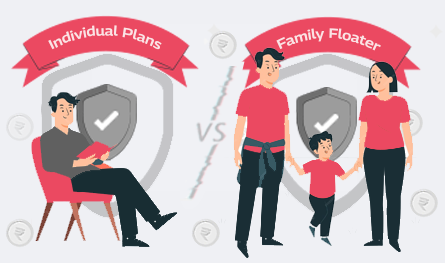
While health insurance is a necessity for everyone, the ‘one-size-fits-all’ approach is not applicable here. While some may be looking to get a policy for their entire family, some may just need single-person coverage. Choosing the right health insurance policy is very important. Not only does it make a difference in the extent of the coverage, but also in your budget. Two of the most popular types of health insurance policies are individual plans and family floater health insurance.
Understanding the key differences between the two will provide you with greater clarity regarding which one to choose. In this guide, we will discuss the differences between these two, their working mechanisms, coverage, and premiums. Read on to make an informed decision when choosing the right health insurance policy.

As the name suggests, individual health insurance provides coverage for a single person. With this policy, you can get coverage for one person, who then gets their sum insured. Depending on the type of health insurance and insurer, the coverage may differ. The policy covers inevitable medical contingencies, such as diseases, accidents, and disasters.
A single health insurance policy that covers the health of your entire family is known as a family floater health plan. This policy covers multiple individuals, such as spouses, children, parents, and parents-in-law. So, depending on your needs, you can get the most suitable health insurance for your entire family.
Often referred to as an umbrella policy, it provides coverage against unforeseen health crises, including accidents and diseases. In a family floater health insurance policy, the sum insured amount is shared among all the insured members. So, anyone in need can use the sum insured. This is why it is referred to as a family floater health plan. Additionally, a senior citizen health insurance plan can be considered for older family members who may need specialised coverage.
When it comes to choosing the right health insurance, whether for yourself or your family, it is essential to understand the key differences between individual and family health insurance plans. Let us understand the differences with this example:
A 26-year-old woman, Megha Tiwari, buys individual health insurance for ₹5 lakh. Her husband has a similar plan for ₹7 lakh. They can both individually claim up to their respective coverage amounts. On the other hand, their friend Priya has a family floater plan of ₹5 lakh that covers her, her husband, and daughter. Any one of them (or all together) can use up to ₹5 lakh in a policy year. Unlike Megha and her husband, the family of 3 have to share the sum insured among them.
Look at the table below to better understand the differences between the two types of health insurance:
| Individual Health Insurance | Family Floater Health Insurance |
| Individual health insurance plans provide coverage for a single person | Multiple individuals can be covered under family health insurance plans |
| The sum insured amount cannot be shared with other members | The sum insured amount is shared among all the insured members |
| The premiums for individual policies are usually higher than family floater | Considering the number of people insured, a family floater usually costs less than individual health insurance plans |
| The age and overall health of the individual play a decisive role in the premium | The age and overall health of the eldest member are considered for premium calculation |
| The policy is suitable for those looking for single individual coverage | Family floater health insurance is good for people who want a single policy for their entire family |
| An individual health insurance covers a single person, and so, the policy does not offer much flexibility | Family floater is a flexible policy as you can get multiple lives covered, like spouse, dependent children, parents, and parents-in-law |
| Tax benefits can be availed for both individual and family health insurance policies. Under Section 80D of the Income Tax Act. | |
As discussed above, in health insurance needs, there is no best type of policy. The choice depends on specific needs and preferences. For instance, an individual health plan may be most suitable for a bachelor whose parents already have health insurance. However, someone with a family consisting of a spouse, children, and parents may opt for a family floater policy to cover everyone in the family. Alongside health insurance, having a term insurance plan can provide additional financial protection for your loved ones.
Therefore, the key to selecting the right policy that caters to your needs lies in understanding your specific requirements. When you know the type of coverage you want, choosing the right type of health insurance becomes easier.


Paybima Team
Paybima is an Indian insurance aggregator on a mission to make insurance simple for people. Paybima is the Digital arm of the already established and trusted Mahindra Insurance Brokers Ltd., a reputed name in the insurance broking industry with 17 years of experience. Paybima promises you the easy-to-access online platform to buy insurance policies, and also extend their unrelented assistance with all your policy related queries and services.

While health insurance is a necessity for everyone, the ‘one-size-fits-all’ approach is not applicable here. While some may be looking to get a policy for their entire family, some may just need single-person coverage. Choosing the right health insurance policy is very important. Not only does it make a difference in the extent of the coverage, but also in your budget. Two of the most popular types of health insurance policies are individual plans and family floater health insurance.
Understanding the key differences between the two will provide you with greater clarity regarding which one to choose. In this guide, we will discuss the differences between these two, their working mechanisms, coverage, and premiums. Read on to make an informed decision when choosing the right health insurance policy.

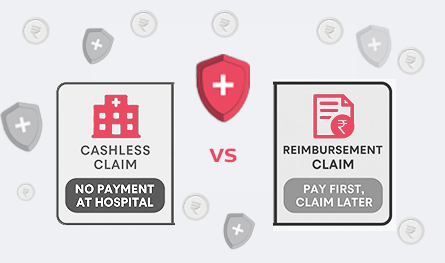
Purchasing health insurance has become a necessity, especially with the news of the double-digit medical inflation being a topic in nearly every discussion. With the introduction of digital platforms, buying a policy has become easier than ever. However, one aspect that remains unclear is how to maximise the benefits of your health insurance. While this may appear overwhelming at first, taking one step at a time and starting with the claim settlement can help ease the decision-making process.
Typically, most health insurance providers offer two types of claim settlement procedures: cashless and reimbursement. Let’s understand the differences between the two and how to choose the right kind of claim settlement for your insurance plan.

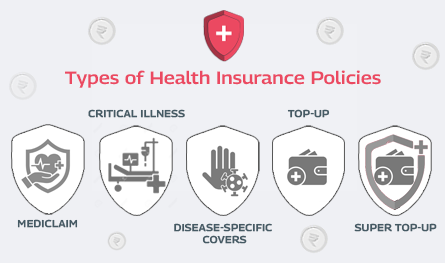
Life is often filled with uncertainties over which we have little to no control. The best we can do is to keep ourselves prepared to handle any type of crisis smoothly. Let’s take one step at a time and start by purchasing a robust health insurance plan that promises to cover medical emergencies in exchange for minimal premium payments.
Purchasing health insurance can be overwhelming due to the numerous types of plans and their varying levels of coverage. Let’s learn about the different types of health insurance policies.

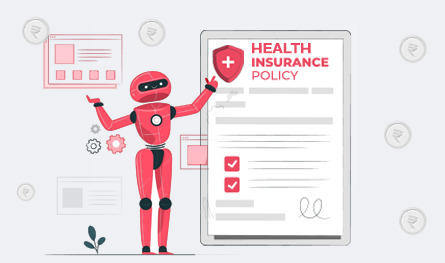
There are many issues that the health insurance sector has often struggled with. This includes problems like delayed claim processing, complex paperwork, and fraud detection. However, with AI in the picture, things are changing fast and for the better. With many insurers using AI for health insurance today, they are better able to handle repetitive tasks, streamline claims, and improve customer satisfaction.

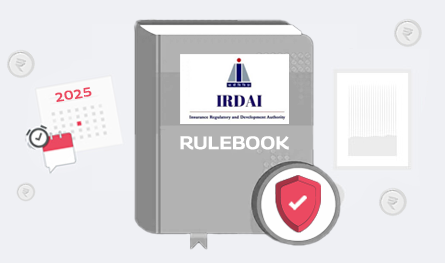
The Insurance Regulatory and Development Authority of India (IRDAI) is the primary body that governs and regulates the insurance sector in the country. The body introduces new rules every year to enhance transparency, protect policyholders, and ensure that insurers provide better service.
The changes in the IRDAI health insurance regulations in 2025 are primarily aimed at making health policies more inclusive and seamless for the public. Here is a look at everything new this year.
